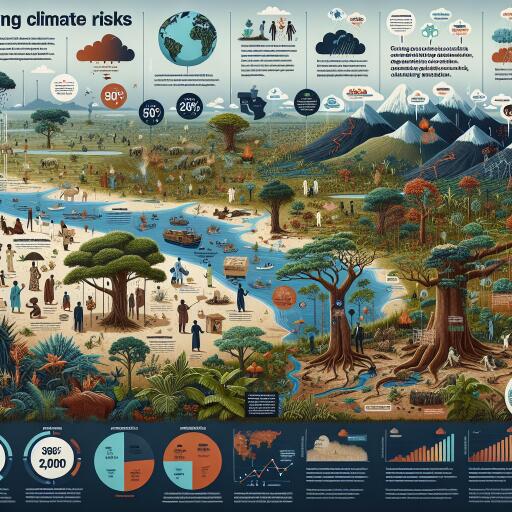
Addressing Nigeria’s Rising Climate Risks
Nigeria finds itself grappling with the ever-intensifying conundrum of climate change, which presents a series of perilous risks spanning from environmental degradation to socio-economic disruptions. The implications of this evolving climate crisis underscore the urgency for targeted action to stem the tide of its far-reaching effects. From severe droughts and encroaching desertification to the menace of rising sea levels and unpredictable rainfall patterns, Nigeria’s environmental fabric is undergoing unprecedented strain.
The ripple effects of these environmental alterations are profound, touching on agriculture, exacerbating food insecurity, eroding biodiversity, and laying the groundwork for socio-economic instability in a nation already navigating a complex landscape of challenges. With a burgeoning population, the stakes are even higher, as dwindling natural resources set the stage for increased competition and potential conflicts.
The complexities of climate change in Nigeria come into sharper focus when considering the detrimental outcomes of human activities such as rampant deforestation, unchecked urban expansion, and industrial activities. These actions compound the country’s vulnerability to climate anomalies, particularly heatwaves that have become more frequent and severe, posing health risks and taxing the country’s limited resources.
With the nation’s tree cover alarmingly reduced to a mere fraction of what is necessary for ecological balance, the urgency for reforestation and sustainable land management practices cannot be overstated. Such environmental degradation not only threatens biodiversity and climate regulation but also undermines the livelihoods of numerous communities dependent on these natural resources.
Water scarcity and land disputes fueled by climate impacts are sharpening existing social and economic tensions, particularly in Northern Nigeria where dwindling resources breed conflict between herders and farmers. Similarly, the encroachment of rising sea levels on coastal communities in the South displaces populations and stretches limited resources even thinner, illustrating the multi-faceted nature of climate threats.
The specter of climate-induced conflict further complicates the nation’s security landscape, linking environmental deprivations with the surge in insurgency and extremism. The dwindling fortunes of Lake Chad, for example, have not only eroded economic stability but have also fostered conditions ripe for the exploitation by extremist groups, highlighting the intricate connections between environmental decline and national security.
Against this backdrop, it becomes imperative for Nigeria to champion efforts aimed at restoring its natural environment through reafforestation and the promotion of responsible forest management. The battle against climate change will also benefit significantly from investing in climate-resilient agricultural practices, enhancing water management strategies, and developing infrastructure capable of withstanding erratic weather patterns.
Moreover, the implementation of early warning systems and fostering community dialogues on resource management emerge as critical strategies for mitigating the impacts of climate change. Such collaborative efforts can pave the way for shared solutions that not only conserve resources but also secure livelihoods, thereby contributing to the social and ecological resilience of the nation.
Understanding climate change as a quintessential security threat allows for an integrated approach towards building resilience and averting conflict. This necessitates a synergistic effort among environmental bodies, security forces, and community stakeholders. By weaving climate considerations into national security strategies, Nigeria can navigate the tumultuous waters of its climate crisis, safeguarding both its environment and its people against the looming threats of a warming world.





Leave a Reply